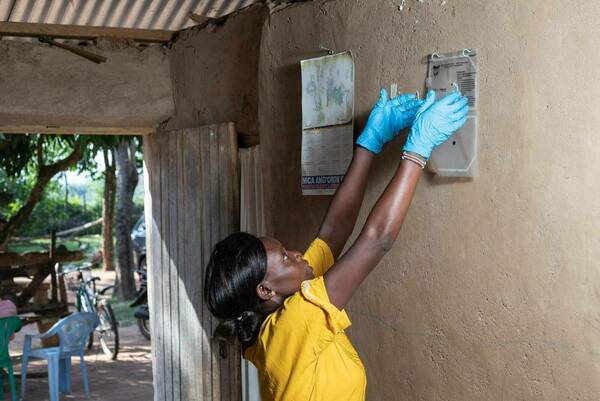Merlin Bruening named 2025 Outstanding Teacher in Notre Dame College of Engineering
Merlin Bruening, the Donald and Susan Rice Professor of Engineering in the Department of Chemical and Biomolecular Engineering, has won the 2025 Outstanding Teacher Award in the Notre Dame College of Engineering.
The award honors an engineering faculty member — selected each year by undergraduates in engineering — for excellence in teaching and overall positive influence on student formation.
Bruening, who also holds a concurrent appointment in the Department of Chemistry and Biochemistry, teaches across the core chemical engineering curriculum, with a focus on transport phenomena, thermodynamics, and separation processes. He also teaches specialized courses in surface characterization methods and chemical engineering laboratory instruction.
His lab develops thin films for protein purification, contributes to membrane technologies for water reclamation, advances ion separation for energy and environmental applications, and refines antibody analysis for drug development.

Students praised Bruening’s ability to clarify conceptually challenging material, his engaging classroom presence, his contagious enthusiasm, and his personal commitment to every student. Many said that they “loved going to class every day.” One nomination stated: “They say that you might forget the material, but you’ll never forget how the lecturer made you feel. I’m happy to say I’m confident I’ll remember both.”
Bruening’s teaching philosophy focuses on student mastery of fundamental principles and dynamic, student-centered learning. “As an instructor, my first goal is to engage students and make the course enjoyable and entertaining,” said Bruening. “In a classroom setting, this includes learning every student’s name so I can call on them; lecturing without notes so I can look students in the eye to gauge their understanding; providing detailed lecture notes to students so they don’t have to worry about copying things down; and telling a daily joke when our energy wanes. Interacting with students is a joy.”
Bruening is a recipient of the American Microchemical Society’s Benedetti-Pichler Award, which recognizes outstanding achievements in microanalytical chemistry. He also received the College of Natural Science Distinguished Faculty Award and Innovation of the Year Award at Michigan State University, where he served on the faculty until joining Notre Dame in 2016.
Latest Research
- NSF Cyber SMART’s fall meeting shapes fifth year of project, legacy and future plans, and adds new memberThe U.S. National Science Foundation (NSF) Cyber SMART center gathered for its fall meeting on the University of Notre Dame campus this September. The meeting served as a checkpoint with progress reports and new projects from research leads and students…
- Slavic and Eurasian studies professor wins Humboldt fellowship to research how Russia’s religious past shapes its presentWhen Russia invaded Ukraine on Feb. 24, 2022, Sean Griffin realized his second book needed a new title. Griffin, an associate professor in the University of Notre Dame’s Department of…
- Notre Dame’s R.I.S.E. AI Conference builds interdisciplinary collaboration to inform human-centered artificial intelligenceAs artificial intelligence (AI) transforms nearly every sector of society — from healthcare and education to governance and global development — a critical question emerges: How can we conscientiously design and deploy these powerful technologies to positively impact society? This…
- University of Notre Dame joins the Global Coalition of Ukrainian StudiesThe University of Notre Dame has joined the Global Coalition of Ukrainian Studies after signing a Memorandum of Cooperation (MOC), formalized on September 24, 2025, at the Ukrainian Institute of America in New York City. Notre Dame joined four other American…
- The University of Notre Dame’s Mendoza College of Business and Industry Labs team up to inspire national security manufacturing competitiveness in the regionThe South Bend - Elkhart Region is full of manufacturing companies that are poised to grow, and Executive Master of Business Administration (EMBA) and Master of Business Administration (MBA) students at the University of Notre Dame are finding innovative ways to contribute to that growth. Earlier…
- Notre Dame research informs WHO conditional recommendation for spatial repellents in malaria vector controlThe World Health Organization (WHO) recently announced a “conditional recommendation” for spatial emanators, also known as “spatial repellents,” in the fight against malaria. This key determination was informed by spatial repellent studies that included the Advancing Evidence for the Global Implementation of Spatial Repellents (AEGIS) Project in Kenya, led by the University of Notre Dame and funded by Unitaid. The findings from this particular study were recently published in The Lancet.













